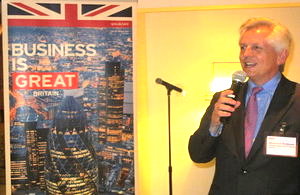UK trade envoy says aviation sector key to PH economic growth

UK Prime Minister’s Trade Envoy Richard Graham. GOV.UK
LONDON — As part of his official visit to the Philippines, MP Richard Graham, UK Prime Minister’s Trade Envoy to the Philippines and the ASEAN economic community at large, underscored the crucial role of the national’s aviation sector in driving “massive national economic growth” over the next two decades.
Speaking at Alpha Aviation Group (AAG) Philippines, a top-tier training provider based in Clark, Graham deemed the Philippines as the “premier aviation training hub in the region,” and suggested that further aviation sector development could boost the Philippines’ “huge competitive advantage.”
Graham also hailed AAG’s targeted efforts to provide for the industry’s growing training needs, as well as its “Women in Aviation” advocacy. It is estimated that around 3 percent of the world’s commercial pilots are women.
‘Unprecendented’ growth in air travel
Cristopher Magdangal, general manager at AAG, noted the “unprecedented” growth in air travel that the region is undergoing – Ninoy Aquino International Airport (NAIA) alone is one of the top 20 fastest growing airports worldwide in terms of passenger number – and reiterated the group’s dedication to helping fulfil today’s “staggering demand for world-class airline pilots.”
Aerospace giant Boeing recently predicted that by 2036, the Asia-Pacific region will lead extraordinary global growth in industry demand, needing at least 248,000 new pilots, 268,000 new technical personnel and 298,000 new cabin crew.
It is highly likely that Philippine pilots will see a rapid increase in their global recruitment.
Producing world-class pilots
A 2007 study published in the International Journal of Aviation Psychology found that the attitudes of specifically Filipino pilots strongly adhered to crew resource management (CRM) principles, with the Filipino culture of pakikisama and pakikibagay reinforcing CRM teachings on teamwork and crew coordination.
Researchers further noted that “the Filipino culture is collectivist in nature”, which makes it “easy for them to assimilate the concept of teamwork and communication in the cockpit because they are used to it.”
Thus, thanks to a mixture of technical proficiency in handling aircrafts, their ability to fluently speak and understand English, and their highly adaptable, professional and communicative natures, Filipino pilots are now being specifically headhunted by leading international airline companies.
With the regional aviation sector set to boom, the time is ripe for the next generation of Filipino pilots to fly.














